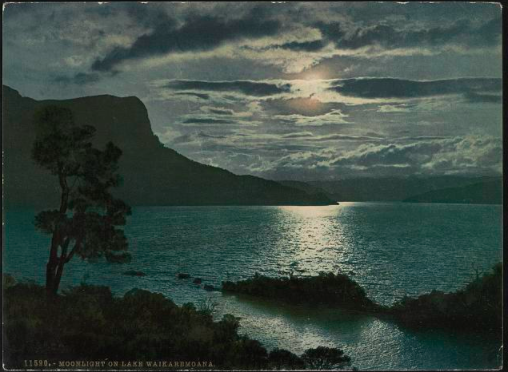The Autumnal Moon
By Anonymous
Annotations by Abby Army

I.
Daughter of Earth! ye wander hand in hand
On your unpatched, immeasurable way,
Together mingling with the starry band,
Chanting to cherubim[1] their measured lay:
Thy sleep is on her bosom. Where expand
Her silent vales[2] and deep blue waves at play;
Gently they glow beneath thy radiance mild;
As joys the mother in her young-eyed child.
II.
Nations have worshipped thee. By the dark Nile
Have maidens wreathed thy lilies in their hair,
While from thy temple on Memphian[3] isle,
Music and fragrance gushed upon the air,
Adoring Persians, by their mountain pile,
Have watched thy slow majestic rising there;
The war-roused Moslem[4] 'mid his steel-clad might,
Lifts high the crescent form, and hails the fight.
III.
Queen of the weird and witching hour! thy beam
Calls the logjam fairies from their mossy rest;
Titania[5] and her train by some wild stream,
Dancing upon the green sward’s[6] spotted vest;
Some troop away to gladden with a dream
The fevered artisan, with toil opprest[7];
Spirits unshrived[8], to troubled sleep consigned,
Rise in their sheeted robes and haunt the wind.
IV.
At this thy banquet eve, the revelling sea
Moves in her festal[9] robe of white arrayed,
While silken leaves on many a wind-swept tree,
Glitter with ever-varying light and shade.
The riven[10] oak now silvered o'er by thee,
Stoops with a grace amid the darkling glade:
And the hoar[11] ruin mouldered[12] wide with time,
Tells a long legend of its olden prime.
V.
The fond heart stirred with thy mysterious spell,
Yield to aeffections[13] beautiful and rare;
The maiden lingers in the shady dell,
The mother listens to her infant’s prayer:
The soldier, musing, hears the village bell,
In the deer breathing of the fitful air;
While the young seaman in the plashing[14] foam,
Hails welcoming voices at his father’s home
Anonymous. “The Autumnal Moon.” The Knickerbocker 7, no. 5 (May 1836): 500.
Photoglob Co., ed. Moonlight on Lake Waikaremoana. 1911. Photograph. Library of Congress. https://www.loc.gov/pictures/item/2017649298/
[1] In the art of the Renaissance, cherubim (or cherubs) are depicted as chubby babies with wings. One of the groups of the angels (dictionary.com)
[2] A more or less extensive tract of land lying between two ranges of hills, or stretches of high ground, and usually traversed by a river or stream; a dale or valley, esp. one which is comparatively wide and flat (Oxford English Dictionary)
[3] A native or inhabitant of the ancient Egyptian city of Memphis (dictionary.com)
[6] Usually with defining phrase of the earth, etc.: The surface or upper layer of ground usually covered with herbage (Oxford English Dictionary) [7] Spelling from original poem [8] not Present oneself to a priest for confession, penance, and absolution (lexico.com) [9] Of or pertaining to a feast or festivity (Oxford English Dictionary) [10] To tear apart or in pieces by pulling or tugging; to rend or lacerate. In early use also: to destroy (Oxford English Dictionary) [11] Grey-haired with age; venerable (Oxford English Dictionary) [12] To decay to dust; to rot; to crumble. Frequently with away; occasionally with down, up (Oxford English Dictionary) [13] Spelling from original poem [14] To interlace (growing branches, etc.) in trelliswork; to support or train against a trellis or a wall. Also figurative (Oxford English Dictionary)Contexts
[4] The concept of the “war-roused Moslem”[sic] is not a contemporary idea. This poem shows that even in 1836, there was a misconception surriounding the Muslim faith since it was perceived as so different than the Christian religion.
[5] The author’s reference to Titania (from Shakespeare’s A Midsummer Night’s Dream) adds an extra layer of depth to the narrative of the moon
Contemporary Connections
It is interesting that the author brings up Titania in relation to the moon as one of Uranus’ moons is actually named Titania. While it was probably not named until well after this piece was written, it is a nice connection to make in the modern-day classroom.